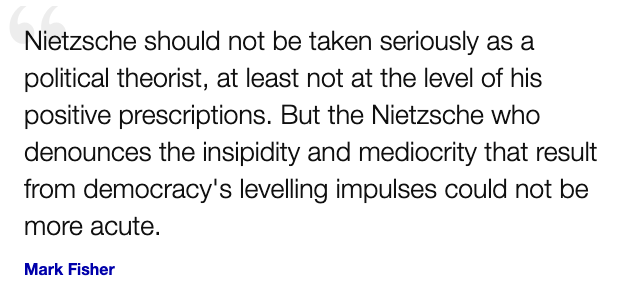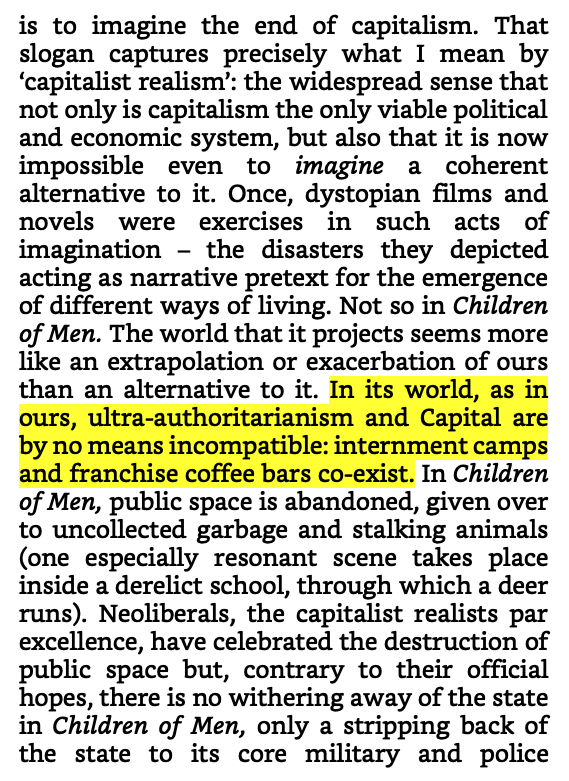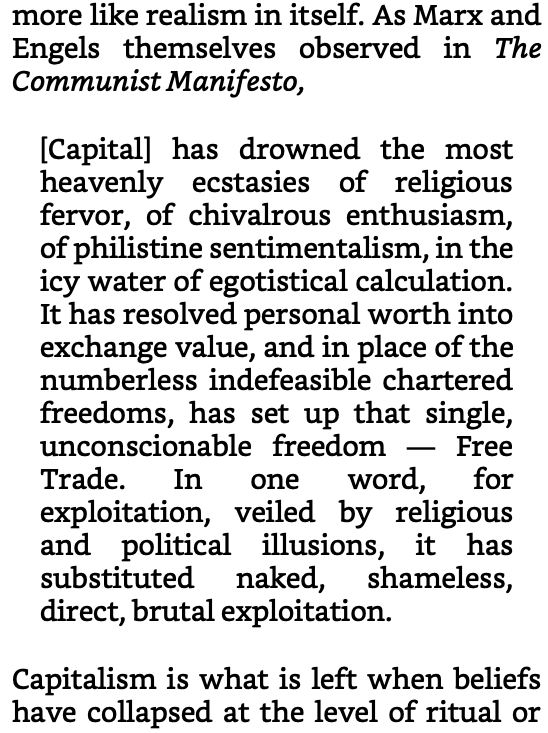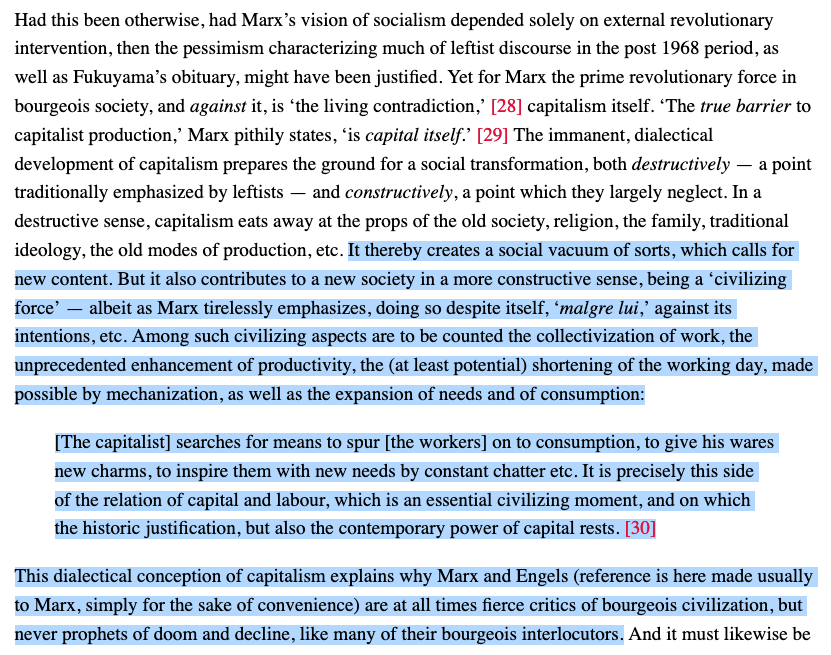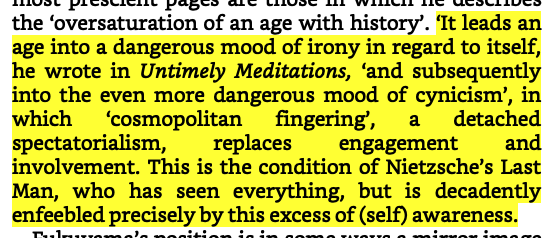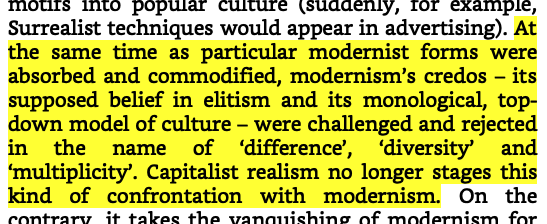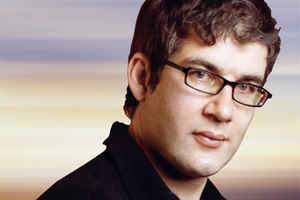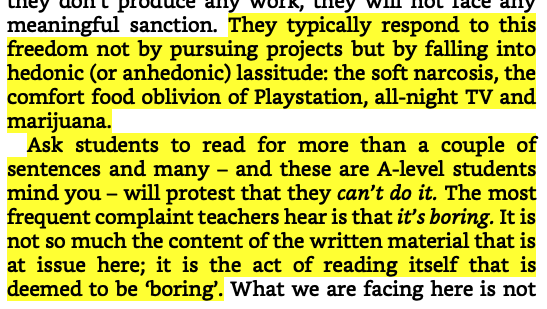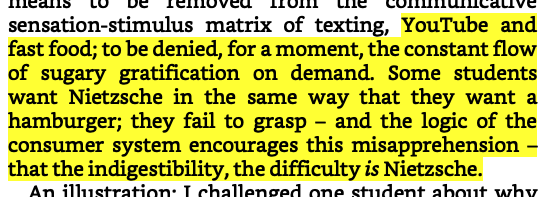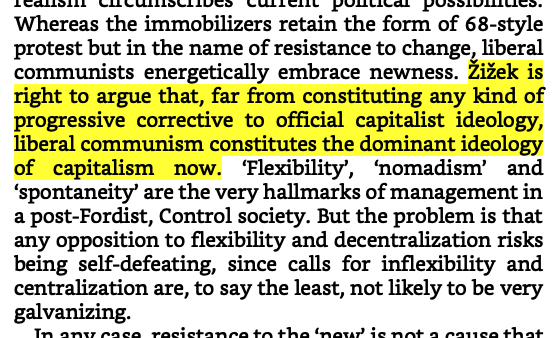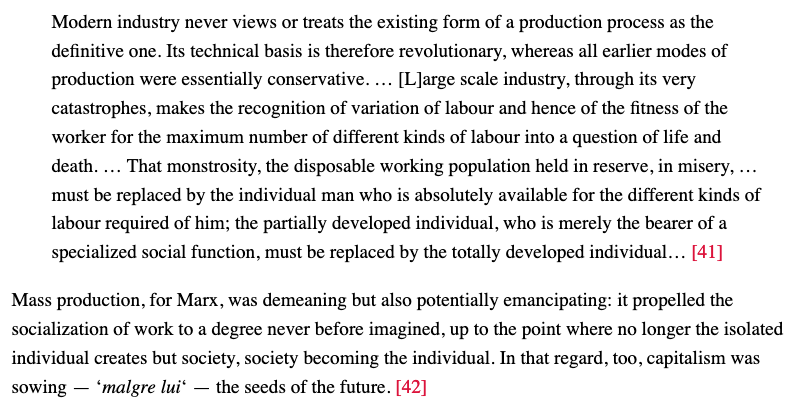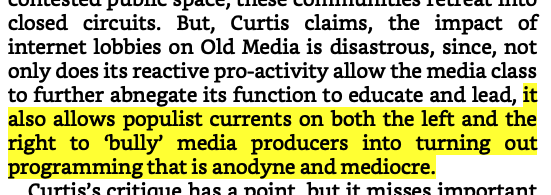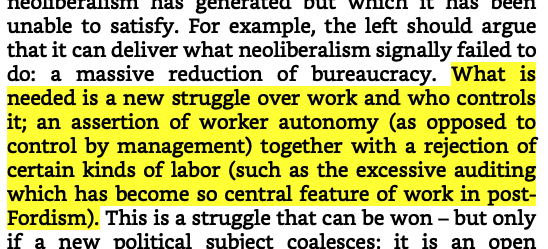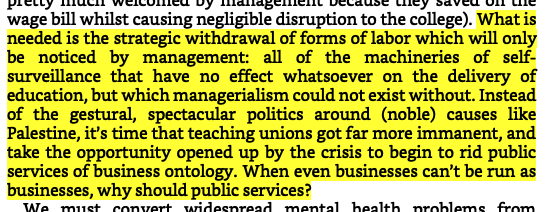I'm starting to discern a Nietzsche -> Mark Fisher -> Capitalist Realism -> "anti-idpol" pipeline.
Still fuzzy around the edges, but *very nihilistic* at its core.
That someone who hated the masses so much (Fisher) developed such a following in the imperial core speaks volumes!
Still fuzzy around the edges, but *very nihilistic* at its core.
That someone who hated the masses so much (Fisher) developed such a following in the imperial core speaks volumes!
I think Nietzsche's poetic writing is like catnip for those who like to see themselves as tortured souls (but also hate victimhood).
I think what Fisher did in a sense was cut out a lot of the outright proto-fascism, and replaced it with socialist-y rhetoric.
Powerful combo.
I think what Fisher did in a sense was cut out a lot of the outright proto-fascism, and replaced it with socialist-y rhetoric.
Powerful combo.
I'm just gonna re-read CR, it's short.
*Two pages in* Fisher explains that "Children of Men" posits a future where Capital is "not incompatible" with "ultra-authoritarianism"...
This implies Capital, at the time of writing, wasn't authoritarian, yet somebody else had been. Who?
*Two pages in* Fisher explains that "Children of Men" posits a future where Capital is "not incompatible" with "ultra-authoritarianism"...
This implies Capital, at the time of writing, wasn't authoritarian, yet somebody else had been. Who?
Compare Fisher's Nietzschean selection from the Manifesto to Ishay Landa's.
Landa emphasizes how Marx and Engels' dialectical analysis of Capitalism exposes it as sowing the seeds of its own destruction, giving cause for *optimism*:
https://redsails.org/whos-afraid-of-the-end-of-history/
Landa emphasizes how Marx and Engels' dialectical analysis of Capitalism exposes it as sowing the seeds of its own destruction, giving cause for *optimism*:
https://redsails.org/whos-afraid-of-the-end-of-history/
It's always Marx vs. Nietzsche, it seems.
And it seems a decade ago you may have just as well said Ishay Landa vs. Mark Fisher!
And it seems a decade ago you may have just as well said Ishay Landa vs. Mark Fisher!
Nietzsche says something else on that exact essay, "Untimely Meditations."
It's not very communist at all!
It's not very communist at all!
"in name at least"
Interesting how one of the main philosophers of the "anti-idpol" movement, Mark Fisher of Vampire Castle fame, is casually dismissive of AES.
And yet his disciples insist "class primacy" is fundamental, reality be damned.
Interesting how one of the main philosophers of the "anti-idpol" movement, Mark Fisher of Vampire Castle fame, is casually dismissive of AES.
And yet his disciples insist "class primacy" is fundamental, reality be damned.
Cuba, Vietnam, Bolivia, Venezuela, Laos, and China? Who cares what they're up to.
British miners? *That's* socialism.
It seems some British people just cannot comprehend they're not the protagonists of history.
British miners? *That's* socialism.
It seems some British people just cannot comprehend they're not the protagonists of history.
I don't know if everyone reads this like I do, but to me it reads like a The Spectator rant against political correctness, feminism, and hip hop--but the author is wearing an ill-fitting hard-hat.
I actually enjoy Nirvana quite a bit, but it seems to me he's an ill-fitting choice for some kind of superlative victim.
I guess he's a suitable Jesus figure for the latent Christian puritanism that runs along the whole narrative.
I guess he's a suitable Jesus figure for the latent Christian puritanism that runs along the whole narrative.
Ah yes, when hip hop defeated rock.
A tragic moment in socialist history.
The coroner, Simon Reynolds (featured on the left) pronounced it dead on the scene.
A tragic moment in socialist history.
The coroner, Simon Reynolds (featured on the left) pronounced it dead on the scene.
I find this text immensely disagreeable, there's something I dislike in almost every sentence, but if I keep writing a post about every highlight I won't finish tonight so, I'll try to start aggregating them a bit.
Presume incompleteness.
Presume incompleteness.
I guess it's notable how Fisher disciples keep telling minorities and women they're being insanely divisive with their petty identitarian egoism or whatever, and yet Fisher talks more about pop trends than geopolitics.
1) the raison d'etre of propaganda is to ensure compliance! subjective defeatism is crucial for social control!
Parenti: "they *only* care about what you think."
2) "Fascism or Stalinism",
Parenti: "they *only* care about what you think."
2) "Fascism or Stalinism",

"we are able to fetishize money in our actions"
This is not how commodity fetishism works at all.
Fisher approvingly cites Zizek decrying our "overvaluing of belief," then miscontrues domination by Capital as result of "ironic distance."
https://redsails.org/why-marxism/
This is not how commodity fetishism works at all.
Fisher approvingly cites Zizek decrying our "overvaluing of belief," then miscontrues domination by Capital as result of "ironic distance."
https://redsails.org/why-marxism/
First thing in this whole work that I sort of agree with (although he takes it in a disagreeable nihilistic direction).
Capitalism is historical process to be understood and overcome, and liberalism is its ideology.
It's not an opinion to be disagreed with.
Capitalism is historical process to be understood and overcome, and liberalism is its ideology.
It's not an opinion to be disagreed with.
He talks about solutions and alternatives, and focuses on concepts Mental Health and opposing "decentralized bureaucratization."
I don't find either particularly strong or far-seeing strategies (more of a "resource nationalization" guy), but there was an effort.
I don't find either particularly strong or far-seeing strategies (more of a "resource nationalization" guy), but there was an effort.
Again, just little disagreements everywhere. I think our schools showcase an *extremely* disciplinary framework. What now?
I guess we have to just roll with it, even though it's a premise upon which further arguments will be built.
I guess we have to just roll with it, even though it's a premise upon which further arguments will be built.
Invocations of the "Stalinist" spectre everywhere, upon which contemporary capitalism is bench-marked favourably. Depleted hopes. Technology evil.
How would he make sense of the Ferguson uprisings?
How would he make sense of the Ferguson uprisings?
This sounds like an old man rant. Possibly a bad teacher, too?
I have my issues with Instagram culture or whatever, but via the act of texting, kids are doing a *whole lot of reading* these days.
I also see people are asking for reading material everywhere on this website.
I have my issues with Instagram culture or whatever, but via the act of texting, kids are doing a *whole lot of reading* these days.
I also see people are asking for reading material everywhere on this website.
he puts "so-called 'liberal communists'" in quotes (referring to Gates and Soros), so as to establish a safe ironic distance insulating himself from critique for using such vulgar anticommunist verbiage...
then goes on to use the phrase without quotes henceforth
then goes on to use the phrase without quotes henceforth
Fisher's mind is stuck pining for an old world, his aristocratic/Nietzschean sensibilities hurting for a noble past.
He doesn't see what Marx saw more than 100 years before him!
He doesn't see what Marx saw more than 100 years before him!
It's correct to point out how our capitalist world is abject. However, we shouldn't be fatalistic!
What do we need capitalists for, once we've de-specialized jobs to the point that many of us can do many of them?
Maybe that's Socialist Realism.
What do we need capitalists for, once we've de-specialized jobs to the point that many of us can do many of them?
Maybe that's Socialist Realism.
Fisher is pretty strong when he weaves what seems to be a personal experience with depression, empathy for other sufferers, relevant and precise statistics to illustrate the prevalence of the issue, and its relation to the organization of society.
I liked that part.
I liked that part.
If anyone's doing "market Stalinism" it seems to be China, thanks to Deng Xiaoping, and it seems to be going relatively well.
Perhaps Fisher was depressed because his window into the world were exclusively other European writers.
I'd be depressed too.
Perhaps Fisher was depressed because his window into the world were exclusively other European writers.
I'd be depressed too.
The part grappling with Land is interesting. They're both kooky in different ways and complement each other well. I think if he'd have spent more time there, maybe it could've been interesting. I'll come back to this at the end.
Liked the section on education once again for its personal anecdotal qualities, found nothing useful about the chapter on dreams.
This makes me think of how empire encircles, chokes off, undermines, and wages hybrid warfare on every socialist state.
Then westerners accuse them of "doing socialism wrong."
Then they go on to conclude there's no alternative to capitalism.
Then westerners accuse them of "doing socialism wrong."
Then they go on to conclude there's no alternative to capitalism.
It's interesting that he rightly calls Kafka smart for what he picks up on here, but doesn't seem to see that Nick Land was saying very similar things when he dismissed him?
Mark Fisher and Adam Curtis always go hand-in-hand.
Curtis is infinitely worse at hiding all that is wrong with their shared worldview, especially when he's not expressing himself visually.
He "says the quiet part out loud": https://web.archive.org/web/20131108200009/http://plover.net/~bonds/pandorasdocs.html
https://twitter.com/abou_rijal/status/1345860933407555585
Curtis is infinitely worse at hiding all that is wrong with their shared worldview, especially when he's not expressing himself visually.
He "says the quiet part out loud": https://web.archive.org/web/20131108200009/http://plover.net/~bonds/pandorasdocs.html
https://twitter.com/abou_rijal/status/1345860933407555585
This evokes Parenti's "the revolution that feeds the children gets my support" vs. Bookchin's "I'd join ancaps to fight socialism if their revolution ever succeeded."
Individualism with anti-capitalist characteristics.
Individualism with anti-capitalist characteristics.
Okay, done!
I didn't like it, obviously.
I think what stands out again and again is his completely unacknowledged habit of extrapolating from his own *insanely localized* experiences, as a white British man, into human universality.
I didn't like it, obviously.
I think what stands out again and again is his completely unacknowledged habit of extrapolating from his own *insanely localized* experiences, as a white British man, into human universality.
So little interest in China, in Latin America... honestly for all the media references he barely leaves the UK!
He speaks of favourite bands and movies, rowdy students, annoyance with smoking bans... which supposedly gives him insight into the human condition.
He speaks of favourite bands and movies, rowdy students, annoyance with smoking bans... which supposedly gives him insight into the human condition.
However, it doesn't really.
The essay is at its best when it's about his own frustrations with Britain: depression and bureaucracy. Reminds me of Vancouver.
The grandiose proclamations and insight into human society though? Uninformed and uninteresting.
The essay is at its best when it's about his own frustrations with Britain: depression and bureaucracy. Reminds me of Vancouver.
The grandiose proclamations and insight into human society though? Uninformed and uninteresting.
He's no Nietzsche, and he's *definitely* no Marx.
However, I wonder if what resonates a lot, is that precisely as a watered-down Nietzsche he articulates a kind of "humbled entitlement," widespread among disillusioned imperial core white workers.
However, I wonder if what resonates a lot, is that precisely as a watered-down Nietzsche he articulates a kind of "humbled entitlement," widespread among disillusioned imperial core white workers.
"If everyone just stopped being so *different* from me, so opaque, if everyone just saw things my way, if we dropped all these pesky modernity-distraction thingies, we could go back! And this time we'd share!"
I don't like that rhetoric!
As Ishay Landa puts it, Marx and Engels' strength, contra that of a lot of their contemporaries, was that:
>Marx could swim with the current of history, so to speak, whereas bourgeois intellectuals had to swim against it. https://redsails.org/whos-afraid-of-the-end-of-history/
As Ishay Landa puts it, Marx and Engels' strength, contra that of a lot of their contemporaries, was that:
>Marx could swim with the current of history, so to speak, whereas bourgeois intellectuals had to swim against it. https://redsails.org/whos-afraid-of-the-end-of-history/
I guess as with Orwell, as with Chomsky... I feel people mistake the undeniable confidence in Fisher's writing for credibility, for earned authority.
He was a depressed and cynical man.
I think the real world offers a lot more possibility and hope than he was ever privy to!
He was a depressed and cynical man.
I think the real world offers a lot more possibility and hope than he was ever privy to!

 Read on Twitter
Read on Twitter